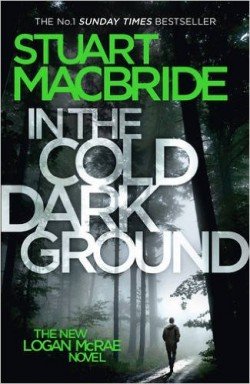
Logan McRae is one of the more endearing Scottish coppers who has risen to fictional fame over the last two decades. Formerly a detective sergeant, he is now in uniform again and has been banished to the bleak north coast of Aberdeenshire, away from his previous haunts in Aberdeen. The story opens with him stumbling through a rugged and rain drenched pine forest, following a Golden Retriever trained to sniff out corpses.
When the body is found – head wrapped in a bin bag – McRae hands the case over to his former boss DCI Roberta Steel, who heads to the forest with her major incident team.
At this point, it’s fair to say that much of the plot is built on previous events. McRae’s long term girlfriend has been lying in a coma for many years, but she appears in the narrative as her former self from time to time, chatting away to McRae. There is nothing paranormal going on, we are simply sharing McRae’s thoughts. In addition, he has got himself into a mighty pickle by becoming the confidante of an ailing gangster, Wee Hamish Mowat. The old villain is now hours from death, and wants McRae to succeed him. Mowat’s chief thug, a brute called Reuben, has other ideas.
MacBride skilfully juggles several plot lines: McRae has some hard decisions to make regarding the comatose Samantha; the corpse in the forest seems to be connected to a pair of feckless businessmen who owe money to gangster Malcolm ‘Malk the Knife’ McLennan; Reuben looms over events like the real-life ogre he is; and, to cap it all, McRae is gobsmacked to discover a close family member he never knew existed.
The gags come thick and fast, scattered over the grim violence like rose petals in an abattoir. DCI Steel usually gets the best lines. “Come on, I saw her checking you out all through the briefing. Yesterday she thought you were a two-foot wide skidmark on the hand-towel of life, now she’s throwing you meaningful glances like they’re on buy-one-get-one-free,” she says.
Sometimes MacBride flies on a wing and a prayer with his relentless mixture of comedy dialogue and brutality, but he just about gets away with it. As a long time fan of the series, I know all about McRae’s unique bond with Roberta Steel – and her wife. It is a daring plot device, and it would be interesting to hear from anyone who comes new to the story. Does it work well? Are the author’s subtle references to the situation clear enough?
From the police procedural angle, as McRae and Steel close the net on their prey, the book is a joy. Not so much for the technical accuracy of how the police operate, but more for the smells and sounds of a provincial police station. There’s the vile coffee, the creaking computers, and the waste bins overflowing with fast food meals snatched and then discarded. There’s the wonderful scene, straight out of Catch 22, where the officer briefing the team needs to mark out crucial deployments on a map, but all they have is a collection of fridge magnets.
“‘Remind me again, who’s the Eiffel Tower?’
Logan checked the list.
‘DI Singh’s team. You’re the penguin in a sombrero. Rennie is the canal boat. DS Weatherford is Thomas the Tank Engine…'”
This novel is hugely enjoyable from the first word to the last. There is pathos, compassion, eye-watering violence, gallows humour and, at the centre of everything, the brilliant creation that is Logan Balmoral McRae. To use the old expression, he is laughed at, chaffed at and spat upon by lowlife criminals and his own superiors, but he retains his core dignity under regular provocation, and when his dogged courage finally does drive him to retaliate, we can punch the air with him and shout, “Yes!”
If you like the sound of this mixture of bleak humour and grim reality, check out Adrian McKinty’s Sean Duffy books, starting with The Cold Cold Ground.
HarperCollins
Print/Kindle/iBook
£8.49
CFL Rating: 5 Stars









